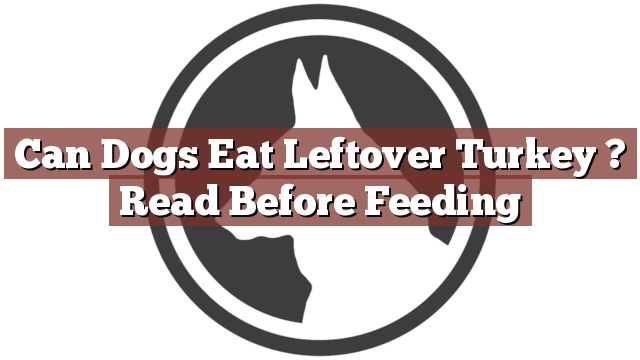Understanding Your Dog’s Dietary Needs
As responsible pet owners, it is crucial to understand the dietary needs of our furry friends. Dogs have specific nutritional requirements that differ from humans. While certain foods may be safe for us, they can be harmful or even toxic to dogs. Therefore, it is essential to be aware of what is suitable for our canine companions to eat.
Can Dogs Eat Leftover Turkey? Read Before Feeding
Can dogs eat leftover turkey? This is a common question that arises during festive seasons or after a hearty Thanksgiving meal. The answer is both yes and no. While cooked turkey itself is generally safe for dogs, the way it is prepared and seasoned can make a significant difference. It is crucial to be cautious and consider a few factors before feeding leftover turkey to your furry friend.
Pros and Cons of Feeding Leftover Turkey to Dogs
There are pros and cons to feeding leftover turkey to dogs. On the positive side, turkey is an excellent source of lean protein, which is essential for a dog’s overall health. It contains essential amino acids that aid in muscle development and repair. Additionally, turkey provides vitamins and minerals such as vitamin B12, iron, and zinc, which are beneficial for dogs.
However, there are also potential drawbacks to feeding leftover turkey to dogs. Seasonings, spices, and other additives commonly used in cooking can be harmful to dogs. Ingredients like garlic, onions, and certain spices can be toxic and cause digestive problems, anemia, or even damage to red blood cells. Moreover, the high-fat content in turkey skin or fatty leftovers can lead to stomach discomfort, pancreatitis, or obesity in dogs.
Conclusion: Considerations for Feeding Leftover Turkey to Your Dog
In conclusion, before feeding leftover turkey to your dog, it is essential to consider a few factors. Can a dog eat leftover turkey? The answer is yes, but with certain precautions. Ensure that the turkey is plain, unseasoned, and cooked thoroughly without any bones. Remove the skin and excess fat before offering it to your dog. Can my dog eat seasoned or spiced turkey? The answer is a resounding no. Avoid giving your dog any turkey that contains ingredients like garlic, onions, or excessive spices.
Always consult with your veterinarian if you have any doubts or concerns about feeding certain foods to your dog. Remember, their health and well-being should always be your top priority. By understanding your dog’s dietary needs and making informed choices, you can ensure they are happy and healthy for years to come.
Thank you for taking the time to read through our exploration of [page_title]. As every dog lover knows, our furry friends have unique dietary needs and responses, often varying from one canine to another. This is why it's paramount to approach any changes in their diet with caution and knowledge.
Before introducing any new treats or making alterations to your dog's diet based on our insights, it's crucial to consult with a veterinarian about [page_title]. Their expertise ensures that the choices you make are well-suited to your particular pet's health and well-being.
Even seemingly harmless foods can sometimes lead to allergic reactions or digestive issues, which is why monitoring your dog after introducing any new food item is essential.
The content provided here on [page_title] is crafted with care, thorough research, and a genuine love for dogs. Nevertheless, it serves as a general guideline and should not be considered a substitute for professional veterinary advice.
Always prioritize the expert insights of your veterinarian, and remember that the health and happiness of your furry companion come first.
May your journey with your pet continue to be filled with joy, love, and safe culinary adventures. Happy reading, and even happier snacking for your canine friend!

